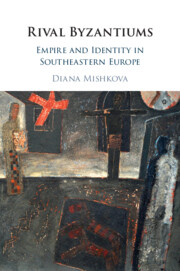Book contents
- Rival Byzantiums
- Rival Byzantiums
- Copyright page
- Contents
- Acknowledgements
- Note on the Text
- Additional material
- Introduction
- Part I On the Road to the Grand Narrative
- Chapter 1 Precursors
- Chapter 2 The Century of History
- Chapter 3 In Search of the ‘Scientific Method’
- Chapter 4 Between Byzantine Studies and Metahistory
- Chapter 5 Byzantium in Ottoman and Early Republican Turkish Historiography
- Part II Metamorphoses of Byzantium after World War II
- References
- Index
Chapter 3 - In Search of the ‘Scientific Method’
from Part I - On the Road to the Grand Narrative
Published online by Cambridge University Press: 01 December 2022
- Rival Byzantiums
- Rival Byzantiums
- Copyright page
- Contents
- Acknowledgements
- Note on the Text
- Additional material
- Introduction
- Part I On the Road to the Grand Narrative
- Chapter 1 Precursors
- Chapter 2 The Century of History
- Chapter 3 In Search of the ‘Scientific Method’
- Chapter 4 Between Byzantine Studies and Metahistory
- Chapter 5 Byzantium in Ottoman and Early Republican Turkish Historiography
- Part II Metamorphoses of Byzantium after World War II
- References
- Index
Summary
The chapter discusses the institutionalisation of Byzantine studies as a separate field in western Europe and Russia and the impact of the positivist (‘scientific’) method on the production of historical knowledge in southeastern Europe. This phase in the development of the national historiographies coincided with the emergence of the first cohort of professional Balkan medievalists and byzantinists in these countries. But if the critical turn imposed discipline on Romantic nationalism, historical Romanticism continued to nourish attitudes and interpretations, often reiterating the underlying tenets of Romantic historiography. The scientific paradigm was readily adopted to legitimise particular readings of the national cause and preoccupation with constructing national identity came to be seen as the core vocation of the professional historian. The positivist historiographic phase thus came to be characterised by different ways of conceptualising and instrumentalising the Byzantine history and legacy not just across national narratives but within discrete historiographies, on behalf of sometimes diametrically opposed political values and competing political projects.
Keywords
Information
- Type
- Chapter
- Information
- Rival ByzantiumsEmpire and Identity in Southeastern Europe, pp. 76 - 122Publisher: Cambridge University PressPrint publication year: 2022
